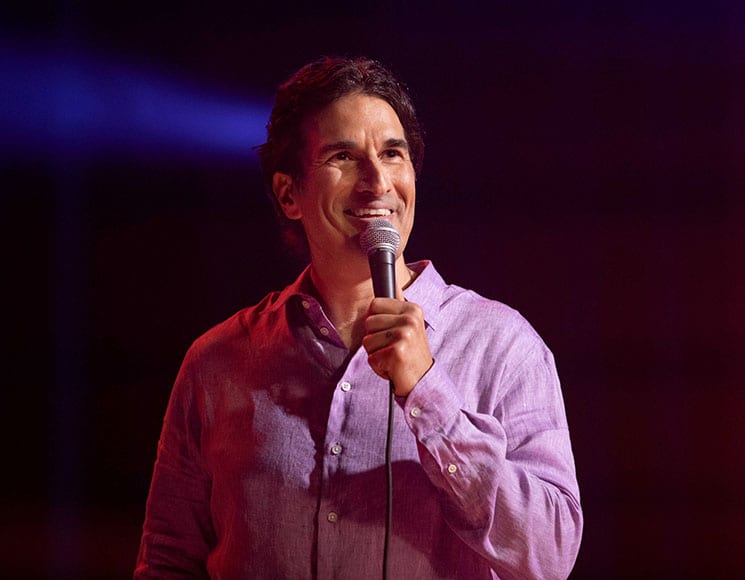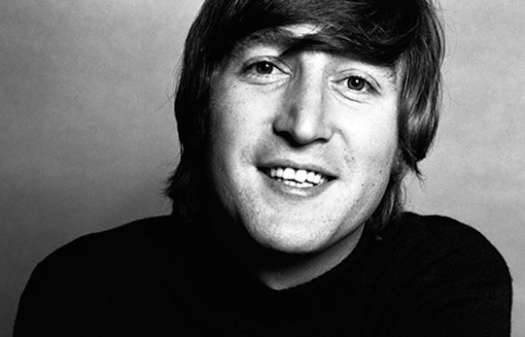It's rather shocking, the mental illness and depression that comedian Gary Gulman has been suffering from, particularly over the past two years. In this courageous and profoundly insightful comedy special, interspersed with documentary footage of Gulman's personal life, executive producer Judd Apatow adds yet another chapter to his ongoing contention that the darkness in comedy must be analyzed and empathized with.
It should be noted that, despite Apatow's involvement, his role feels more like a co-sign; this is Gulman's heart-and-soul project through and through. He is alone on stage, telling the well-crafted jokes and anecdotes we've come to expect from him, mixing his uncommonly great observational gifts with his fascination for the random absurdity of the language we use in common speech.
He shares conversations with his mom at her Massachusetts home, where he grew up (and had to move back into during a recent decline in his health), not to mention his wife Sadé (not that one) in their 600-square-foot New York apartment, his friend and fellow standup Robert Kelly and his psychiatrist Dr. Friedman. They're obviously revealing exchanges (Kelly had no idea that one of his best friends was in such pain, as Gulman never told him) but the ultimate purpose for these scenes, and The Great Depresh generally, beyond provoking laughter, is to shine an instructive light on a crippling condition.
When Gulman released It's About Time in 2016 (which Exclaim! named the top comedy special of that year), Gulman seemed to finally be enjoying a richly deserved moment. Years and years of respect from his peers was translating into transcendent appreciation for his unique contribution to the craft; he was destroying on late night network TV shows and touring extensively. But according to The Great Depresh, within a year of It's About Time, Gulman was literally (proper usage there btw, which Gulman might appreciate) incapacitated by depression and, after trying virtually every anti-depressant on the market (including ketamine, which he explains, really isn't on the market), he eventually entered a psychiatric hospital for three weeks and engaged in successful rounds of electro-convulsive therapy.
Gulman openly discusses how suicidal impulses find him, tracing his pathology back to a 94 percent free throw shooting spree in high school, receiving a football scholarship from a college and the strange kinship he, as a depressive, feels with sunsets. The comedy in this special is high-level and profound, but given the compulsion to pander to our emotional impulses in this context, it is strikingly and truly amusing first. Gulman is funny and, along with the support of his family (he kept many friends out of the loop about his downturn in 2017), being funny has kept him alive.
As he experienced an upswing after an unexpected social gathering, Gulman uses The Great Depresh to reach out and connect with others who suffer in isolation from the same form of difficult, therapy-resistant depression. It laughs at his pain but only as a vehicle to document the struggle and how he overcame it. It is among the most hopeful and hilarious expressions in recent memory and, with his charm and playful spirit, Gary Gulman has added a great contribution to the comedy canon with The Great Depresh.
(HBO)It should be noted that, despite Apatow's involvement, his role feels more like a co-sign; this is Gulman's heart-and-soul project through and through. He is alone on stage, telling the well-crafted jokes and anecdotes we've come to expect from him, mixing his uncommonly great observational gifts with his fascination for the random absurdity of the language we use in common speech.
He shares conversations with his mom at her Massachusetts home, where he grew up (and had to move back into during a recent decline in his health), not to mention his wife Sadé (not that one) in their 600-square-foot New York apartment, his friend and fellow standup Robert Kelly and his psychiatrist Dr. Friedman. They're obviously revealing exchanges (Kelly had no idea that one of his best friends was in such pain, as Gulman never told him) but the ultimate purpose for these scenes, and The Great Depresh generally, beyond provoking laughter, is to shine an instructive light on a crippling condition.
When Gulman released It's About Time in 2016 (which Exclaim! named the top comedy special of that year), Gulman seemed to finally be enjoying a richly deserved moment. Years and years of respect from his peers was translating into transcendent appreciation for his unique contribution to the craft; he was destroying on late night network TV shows and touring extensively. But according to The Great Depresh, within a year of It's About Time, Gulman was literally (proper usage there btw, which Gulman might appreciate) incapacitated by depression and, after trying virtually every anti-depressant on the market (including ketamine, which he explains, really isn't on the market), he eventually entered a psychiatric hospital for three weeks and engaged in successful rounds of electro-convulsive therapy.
Gulman openly discusses how suicidal impulses find him, tracing his pathology back to a 94 percent free throw shooting spree in high school, receiving a football scholarship from a college and the strange kinship he, as a depressive, feels with sunsets. The comedy in this special is high-level and profound, but given the compulsion to pander to our emotional impulses in this context, it is strikingly and truly amusing first. Gulman is funny and, along with the support of his family (he kept many friends out of the loop about his downturn in 2017), being funny has kept him alive.
As he experienced an upswing after an unexpected social gathering, Gulman uses The Great Depresh to reach out and connect with others who suffer in isolation from the same form of difficult, therapy-resistant depression. It laughs at his pain but only as a vehicle to document the struggle and how he overcame it. It is among the most hopeful and hilarious expressions in recent memory and, with his charm and playful spirit, Gary Gulman has added a great contribution to the comedy canon with The Great Depresh.




